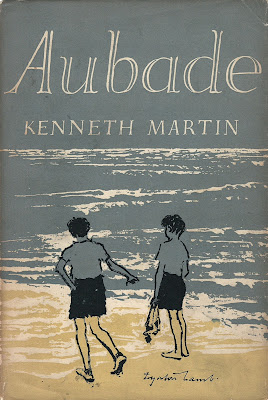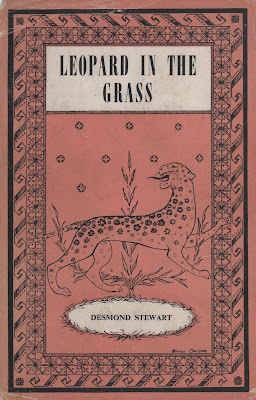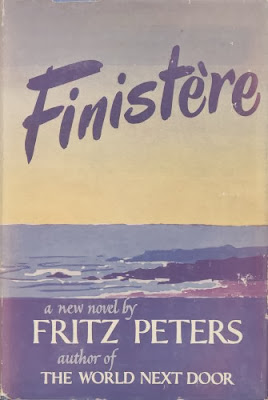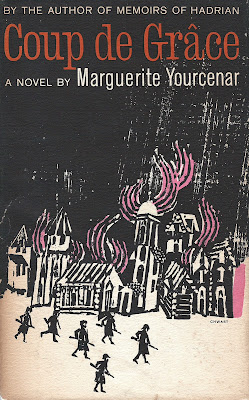 |
| Conflict (c.1926-27) Christopher Richard Wynne Nevinson (English, 1889-1946) Drypoint, printed in red 34.9 x 26.1 cm. Victoria & Albert Museum |
Friday, August 12, 2022
Conflict by Christopher Richard Wynne Nevinson
Sunday, August 7, 2022
Behind the Mirror by Robin Maugham
 |
| London : Longmans, 1955 Jacket design: John Minton |
Tuesday, May 31, 2022
Wednesday, May 18, 2022
Aubade by Kenneth Martin
 |
| London : Chapman & Hall, 1957 |
One day, the young man Paul has named Gary (we later find that his name is John Knight) enters the tobacco shop. Paul had noticed him in church sometime earlier and had thought about what it might be like to be friends with him. Those overwhelming feelings of wanting to spend time with him initially go unclassified, but when they do start spending time together it begins to be clear there is mutual feeling and also what those feelings mean. The battle between one's own feelings and desires versus what one's parents or society expects is ever present as is a pervasive loneliness.
The writing is straightforward, almost blunt. It is easy to judge the authorial skill based on the author's age. To do so, though, would be unfair. The straightforward style is in keeping with Paul's desire to keep people at a distance. Many of the things he says are harsh and in many ways they serve to insure that he will remain lonely. He even says at one point that there is joy in misery. Early on in the novel, the author uses the poem, Black Marigolds, foreshadowing the feelings of sadness related to remembering a first love. Later in the novel, Paul says he "want[s] to remember Gary, and be sad, always."
Black Marigolds is a poem originally written in Sanskrit a portion of which appeared in John Steinbeck's Cannery Row.
Thursday, April 21, 2022
Playwright Christopher Adams to Adapt Screenplay for Undiscovered LGBTQ Classic ‘Finistère’
 |
| Christopher Adams |
Playwright Christopher Adams to Adapt Screenplay for Undiscovered LGBTQ Classic ‘Finistère’
By Matt Donnelly
Variety : April 20, 2022 12:52pm PT
"Playwright Christopher Adams has been tapped to pen a screenplay based on the novel “Finistère.” While not widely known, the novel is a groundbreaking early tale of a gay man who falls in love with his tennis instructor at a French boarding school in the 1920s. It was written by Fritz Peters, whose entire catalogue was recently acquired by Hirsch Giovanni Entertainment. ... Adams is a noted English playwright who recently adapted the limited series “Aubade” for FilmNation. That series is based on a controversial 1957 queer Northern Irish novel [by Kenneth Martin]."
Tuesday, April 19, 2022
David by Eric Gill
 |
| David (1926) Eric Gill (English, 1882-1940) Intaglio print on paper 111 x 70 mm The Tate |
Sunday, April 10, 2022
Leopard in the Grass by Desmond Stewart
 |
| London : Euphorion, 1951 |
Monday, April 4, 2022
Jerry (Jared French) by Paul Cadmus
%201931.png) |
| Jerry (Jared French), 1931 Paul Cadmus (American, 1904-1999) Oil on Canvas Toledo Museum of Art |
Saturday, March 26, 2022
Riding by H. S. Cross
 |
| New York : Fox Books, 2008 |
Riding : a novel, volume 1
ISBN: 978-0-6152-1366-8 — Fox Books 2008, 513p
Lent
Easter
St. Stephen's
Riding : a novel, volume 2
ISBN: 978-0-615-26248-2 — Fox Books 2008, 550p
Summer
Michaelmas
Christmas
Monday, February 28, 2022
Swimmer by John La Farge
 |
| Swimmer (1866) John La Farge (American, 1835-1910) Watercolor 32.5 × 28.2 cm (12 13/16 × 11 1/8 in.) Yale University Art Gallery |
Friday, February 25, 2022
Fritz Peters, Early LGBTQ Literary Icon, Coming to Screens and Bookshelves in New Rights Deal
 |
| Fritz Peters c.1965 Collection of Edward Field |
Fritz Peters, Early LGBTQ Literary Icon, Coming to Screens and Bookshelves in New Rights Deal
By Matt Donnelly
Variety : February 23, 2022 12:32pm PT
"Peters’ most notable work was his second novel, “Finistére.” It is regarded as one of the first gay-centered novels to come out of the era not concerning WWII. It details the adolescence and homosexual encounters of its main character and is said to be inspired by Peters’ own life. Acclaimed by Vidal, it received an unheard of first-run printing of 350,000 copies, according to his estate. It is also the first up for adaptation, with a screenwriter to be announced imminently."
Sunday, February 20, 2022
Finistère by Fritz Peters
 |
| New York: Farrar, Straus, 1951 |
Matthew's Happy Ending
![Fritz Peters correcting galley proofs of his second novel, Finistère November 27, 1950 [cat 3119-0007] Private Collection Fritz Peters correcting galley proofs of his second novel, Finistère November 27, 1950 [cat 3119-0007] Private Collection](https://blogger.googleusercontent.com/img/a/AVvXsEi7Da54P20PmDNTxjla21DeD-x54yQNrY1oqODA-f-1d1TsB7V2c2C6Ebz_0PGir1A0tBGa1kXcv0BPpLE6nf7kgaSswl7PADNKTsRLNyfBDQPcQ2IaBxS7yNMj0eKvQJG3-YWeCM06_8pCKFgUPDXx_UMFgZBnmtqrlC8klxqq-7CmjRJRnwGEipMA=w320-h252) |
| Fritz Peters correcting galley proofs of his second novel, Finistère November 27, 1950 [cat 3119-0007] Private Collection |
Wednesday, January 26, 2022
Ynglingen och döden (Young Man with Death) by Gösta Adrian-Nilsson (GAN)
Tuesday, January 11, 2022
Coup de Grâce by Marguerite Yourcenar
 |
| New York : Farrar, Straus & Cudahy, 1957 |
%20Matelot%20accoude%CC%81,%201929.jpg)
![Finistere by Fritz Peters ; TOP ROW FROM LEFT TO RIGHT: [1] London : Victor Gollanz, 1951 [2] New York : Signet/NAL, 1952 [3] Fin de la Tierra, Spanish translation by A. S. Glanz, Buenos Aires : Editorial Dintel, 1953 [4] The World at Twilight, New York : Lancer Books, 1964 [5] New York : Lancer Books, 1966 [6] London : Victor Gollanz, 1966. ⸻ BOTTOM ROW FROM LEFT TO RIGHT: [7] New York : Lancer Books, 1968 [8] London : Panther, 1969 [9] Los Angeles : Seeker Press, 1985 [10] New York : Plume/NAL, 1986 [11] Vancouver : Arsenal Pulp Press, 2006. Finistere by Fritz Peters ; TOP ROW FROM LEFT TO RIGHT: [1] London : Victor Gollanz, 1951 [2] New York : Signet/NAL, 1952 [3] Fin de la Tierra, Spanish translation by A. S. Glanz, Buenos Aires : Editorial Dintel, 1953 [4] The World at Twilight, New York : Lancer Books, 1964 [5] New York : Lancer Books, 1966 [6] London : Victor Gollanz, 1966. ⸻ BOTTOM ROW FROM LEFT TO RIGHT: [7] New York : Lancer Books, 1968 [8] London : Panther, 1969 [9] Los Angeles : Seeker Press, 1985 [10] New York : Plume/NAL, 1986 [11] Vancouver : Arsenal Pulp Press, 2006.](https://blogger.googleusercontent.com/img/a/AVvXsEj28t2kAu1uP3Mx13EwoLZ0rCmtkxdUq0cu-UVUiRtbWdzRGaWy-E52G2f4x5ZBUH-ST5a2oW4-bzcOxEG15AEQ0q7ostfeH_UaR5qB8pSjpXi7L67GdrNHs9IUwFjage5y4VZMfkZBg-5dCd9ljoLMbqTSs0Fhwsjrm7MbRLMyv4XVYSo4TUx0zKte=w640-h325)
